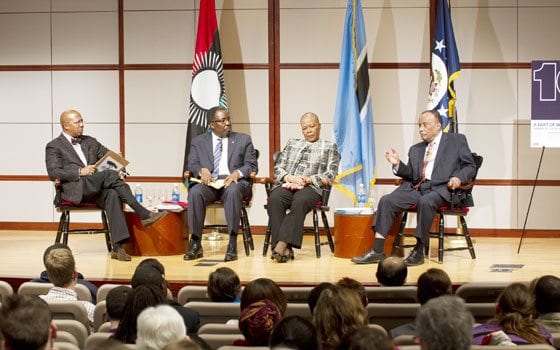
The country people know best in southern Africa is South Africa, because of Nelson Mandela and the long struggle against apartheid.
Its neighbor Botswana has little prominence, in part because the country escaped the same rigid racial separation — by volunteering to become a colony.
In the 1800s, hostile conflicts erupted between ethnic Batswana and Boers, the Dutch settlers of South Africa. Apartheid had yet to be officially born, but strict segregation was already being practiced.
“We were one of the few countries which became a British colony by choice,” said Tebelelo Seretse, Botswana’s ambassador in Washington, D.C. “We wished and feared not to be annexed into South Africa. So our chiefs went to the British and asked for protection, and Britain agreed to protect us.”
The colony then called Bechuanaland was created in 1885. It became surrounded by racist regimes.
“Botswana sits right on top of South Africa,” Seretse explained. “It is landlocked, sharing a border with South Africa, Zimbabwe, Namibia. Zimbabwe was then Rhodesia, practicing apartheid. Namibia was then Southwest Africa, practicing apartheid, as well as South Africa.”
Being controlled by a distant foreign power was appealing for only so long, though. In 1964, the colony’s leaders requested a new arrangement.
“We went back to Britain and said, ‘We think we are ready to govern ourselves,’ ” she said. “They said goodbye. But those visionary leaders had discovered diamonds. They started mining them. If (the British) had known that we had diamonds, they wouldn’t have let us go.”
Seretse, Botswana’s envoy to the United States for the past year, recounted her country’s unusual history during a forum last week on the “State of Africa” sponsored by the African Presidential Center at Boston University.
Botswana’s independence officially came in 1966. Since then, the country has had an unbroken history of stable democratic rule on a continent where former colonies too often have lapsed into authoritarian dictatorships commanded by military officers or civilians.
“Botswana got the governance thing right from the beginning,” said Charles Stith, the former American ambassador to Tanzania who directs the renamed African Presidential Center.
That has been the case because of traditional customs in Botswana, Seretse said, not because of practices imported from Britain.
“Botswana was very fortunate to have visionary leaders,” she said. “Botswana’s democracy is not the European type of democracy.”
Seretse cited “an open, traditional court where there is a plaintiff and a defendant,” and a chief presides. In that way, it resembles the adversarial courts in Western countries.
But consultation also occurs in the court, where “everyone is welcome to participate,” talk and “criticize whoever you wish to criticize, but with another concept that we call Botho — humanity, respect somebody else’s opinion,” she explained.
Seretse added: “So when we talk about tolerance, when we talk about freedom of speech, when we talk about freedom of association, they are not an influence, an ethics, that we get from the Europeans. They are part of our culture.”
Botswana has long received international recognition for its vital, stable democracy, though its origins are not often mentioned. Transparency International rates it as “the least corrupt country on the African continent,” Seretse noted.
Another index rates the African nation as having greater domestic tranquility than even the United States. This year, Botswana ranked number 35 on the Globe Peace Index, while this country came in at number 82.
Besides the traditional customs, Botswana’s relative ethnic homogeneity, compared with other African countries, contributes to Botswana’s stability and peacefulness. About 80 percent of its 2 million people belong to the same ethnic group, Tswana, who also live in South Africa.
Seretse suggested her country has experienced an ironic downside to having good governance, which the International Monetary Fund and World Bank vigorously promote in developing countries.
Botswana, she said, is “being punished for doing well,” because foreign investors and aid officials conclude “you don’t need help.”
But Seretse said the country does need foreign investment and assistance to compensate for the lowered life expectancy and worker productivity because of HIV/AIDS and to diversify an economy that depends too much on a single precious resource, one that is exhaustible.
“We depend on diamonds, but they are not forever,” she said.






